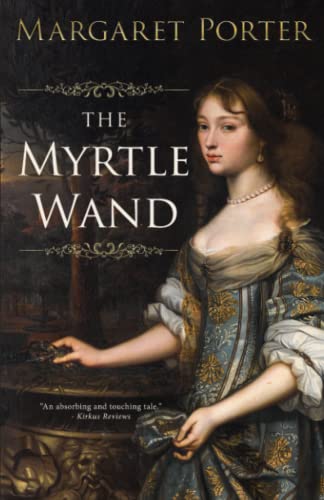The Myrtle Wand
This tragic tale of misunderstandings and betrayal is set in the early days of Louis XIV, before Versailles. 1649: Princess Bathilde de Sevreau and Myrte Vernier are schooled at an Ursuline convent. Françoise d’Aubigné (the future Madame de Maintenon) arrives with her guardian’s instructions to drive out her Protestant leanings. The three are soon fast friends. Bathilde becomes chatelaine over her father’s vast properties and is betrothed to Albin Bertrand, Louis’ agent, who plays a part in finance minister Fouquet’s downfall. Although Louis pressures Bathilde to join his Fontainebleau court, her simplicity of heart leans towards overseeing the vineyards and tutoring Giselle, a young peasant living on the estate. When Albin arrives, disguised as a commoner, Giselle falls head-over-heels, believing she is betrothed.
Bathilde is far too forgiving of Albin, who I didn’t care for, despite his protestations of love and remorse. His cousin, who secretly adores Bathilde, is a more interesting character up until his baseless assessment of her as unfaithful. The first half of the novel is slow, although Porter is an engagingly descriptive writer. Once at court the pace picks up, many historical characters, making appearances. A character list would be useful as people are often referred to by multiple names—Philippe (Monsieur/Highness); Henriette (Madame); Louise (de la Valliere/de la Baume le Blanc); Athénaïs (Madame or Marquise de Montespan/ Françoise-Athénaïs de Tonnay-Charente).
I researched the storyline after finishing the novel, which is based on the ballet Giselle, and could picture dancers sweeping gracefully across a stage, vengeful ghostly spectres, emotion played out in exaggerated gestures. That’s what ballet is, after all: a story without dialogue. Retelling the story as fiction led to over-dramatization and sentimentality in some scenes, which didn’t work for me: the fallen daisy petals, Giselle’s final scene. As a fairy tale this works beautifully, but I was not engaged by it as a historical novel.










